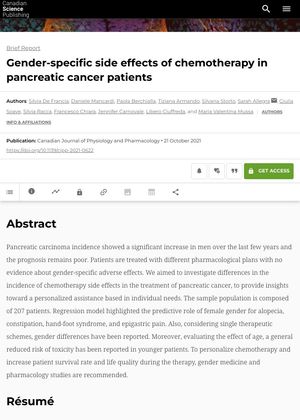TLDR Women with pancreatic cancer are more likely to have certain side effects from chemotherapy than men.
The study "Gender-specific side effects of chemotherapy in pancreatic cancer patients" examined 207 patients and found that female patients were more likely to experience side effects like alopecia, constipation, hand-foot syndrome, and epigastric pain. Younger patients generally had a lower risk of toxicity. The authors suggest more research in gender medicine and pharmacology to personalize chemotherapy, aiming to enhance patient survival rates and quality of life during treatment.
 8 citations
,
December 2018 in “Journal of Dermatological Treatment”
8 citations
,
December 2018 in “Journal of Dermatological Treatment” The PRP-like cosmetic with biomimetic peptides is potentially effective and safe for treating alopecia areata.
717 citations
,
June 2010 in “Nature” Alopecia areata involves both innate and adaptive immunity, with specific genes linked to the disease.
701 citations
,
August 2014 in “Nature medicine” Alopecia areata can be reversed by JAK inhibitors, promoting hair regrowth.
519 citations
,
October 1998 in “Endocrinology” Diet can prevent bone issues but not hair loss in mice lacking vitamin D receptors.
 421 citations
,
April 2012 in “The New England Journal of Medicine”
421 citations
,
April 2012 in “The New England Journal of Medicine” Alopecia Areata is an autoimmune condition causing hair loss with no cure and treatments that often don't work well.
412 citations
,
January 1998 in “Science” A mutation in the human hairless gene causes alopecia universalis.
 391 citations
,
January 2010 in “Journal of The American Academy of Dermatology”
391 citations
,
January 2010 in “Journal of The American Academy of Dermatology” Half of people with Alopecia Areata may see hair regrowth within a year without treatment, but recovery is unpredictable.



